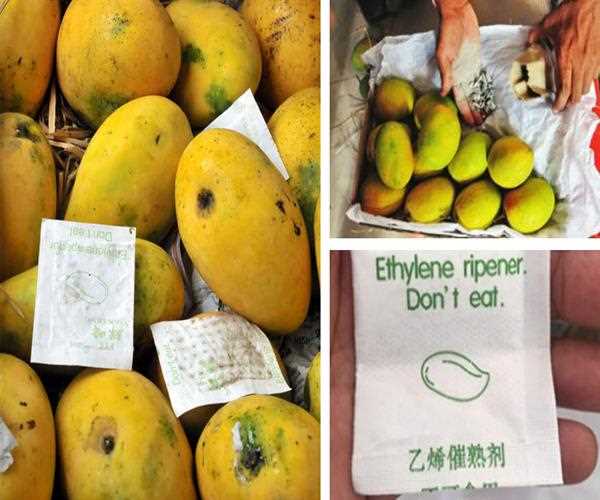
25-May-2024 , Updated on 5/25/2024 10:39:32 AM
Don't use Calcium Carbide to ripen fruit. Why?
Fruit ripening is a normal process that leads to improved flavor, color, texture as well as a nutritional value. However, while seeking to accelerate the process of ripening, some techniques are very hazardous to health. A very risky method involves the use of calcium carbide commonly referred to as “masala” to hasten the ripening of fruits. This article will discuss why it should not be used for ripening fruits for the following reasons, the health risks implicated by using calcium carbide and its better options.
The Hazards of Calcium Carbide
Calcium carbide is known chemical composite, which when brought to contact with moisture gives out acetylene gas. This gas is actually a lookup of the naturally produced gaseous plant hormone called ethylene which is involved in the ripening of different fruits. Nevertheless, this action that acetylene takes is not as efficient as that of ethylene meaning far much greater quantities of acetylene are used to bring ripening about than ethylene. This is but only the tip of the iceberg when it comes to the issue on calcium carbide.
Toxic Byproducts
Arguably one of the biggest disadvantages of employing calcium carbide is generation of hazardous wastes including arsenic as well as phosphorus. In this case, if calcium carbide reacts with water, it is capable of releasing the above-mentioned toxic constituents which pollute the fruit. Ingesting fruits that are ripened using calcium carbide may result in very severe illnesses that include: dizziness, irregular thirst, irritation, weakness, swallowing difficulties, vomiting, and formation of ulcers on the skin.
Health Risks to Consumers
Arsenic and phosphorus in fruits are a considerable threat of adverse health effects. Arsenic also is a recognized carcinogen – that means it can cause cancer. Phosphate while vital for the human body due to its roles in metabolism and the skeleton, can be lethal once present in large amounts. Ingestion of these chemicals causes long term health complications, affecting the organs as well as the nervous system.
Legal Prohibitions
Nonetheless, the process of using calcium carbide for the ripening of fruits is dangerous for health and widely prohibited in many countries. Recent federal bodies such as the Food Safety and Standards Authority of India (FSSAI) have worked to ban it.
Currently, the allowable utilization of calcium carbide to fruit ripening is deemed unlawful based on the Regulation of the Food Safety and Standards (Prohibition and Restrictions on Sales) Regulations, 2011. The regulation provided that, it shall be unlawful for any person to sell or offer or expose for sale or have in any premises for the purpose of sale under any description fruits which have been artificially ripened by the use of acetylene or carbide gas.
Why It Is Still Used
Nevertheless, calcium carbide continues to be used in some areas because of the cost and market demands that require the fruits to ripen early. Thus, consumers remain unaware of the consequences and some areas are not very strict on the usage of the substance. Traders and fruit handlers often use this process to satisfy the market demand of ready-to-eat fruits, especially during specific seasons, for example, mango season.
The Safe Alternative: Ethylene
Ethylene gas is a natural gas that plays a role of a hormone in plants by initiating the ripening of fruits. While calcium carbide is dangerous and somewhat less effective, ethylene is safe and extremely efficient. It may be applied at levels up to 100 ppm or up to a lower level depending on the type of fruit, it varietal, and it ripeness level. Ethylene triggers and regulates many chemical and biochemical reactions which are as follows: natural and even ripening of fruits.
Regulatory Actions and Consumer Awareness
Thus, such regulatory bodies are pertinent to determining the safety of the fruits sold on markets. For example, FSSAI has made notifications and advisories to the traders, fruit handlers and the FBOs to abide with the ban on the calcium carbide. The organization has also appealed to state and UT food safety departments to be on the alert and act erratically on violators of the rules.
Consumer Responsibility
Consumer also should have part to play to make sure that they only take fruits that are good for their health. Thus, knowing the dangers caused by calcium carbide and selecting ripe fruits using safe techniques strongly reduces the likelihood of negative consequences for one’s health. The general practice of checking for certifications and labels that would provide information on whether fruits are allowed to ripen naturally or have been subjected to ethylene treatment may therefore be useful.
Conclusion
Calcium carbide as an inducer of ripening fruits entails severe health hazards, since the process involves the generation of dangerous chemicals such as arsenic and phosphorus. Even though this process is cheap and helps to introduce ripening of fruits at a faster pace, its consequences are horrible. It has been prohibited by regulatory bodies, while safer options such as Ethylene gas are available and encouraged.
Summing up, it is necessary not to use calcium carbide for ripening fruits. By avoiding destructive and health hazardous means of ripening such as the use of ethylene our fruits mature naturally and enhance the consumption of quality fruits. Focus on the useful information, have a healthy life, and avoid dangerous ways of ripening.

Student
An MBA in finance imparts and improves management aptitude, inventive ability, critical thinking ability, and so forth. It offers a real-time experience that fabricates a staunch career foundation for students and working professionals. It helps them to thoroughly understand the financial sector.
Join Our Newsletter
Subscribe to our newsletter to receive emails about new views posts, releases and updates.
Copyright 2010 - 2026 MindStick Software Pvt. Ltd. All Rights Reserved Privacy Policy | Terms & Conditions | Cookie Policy